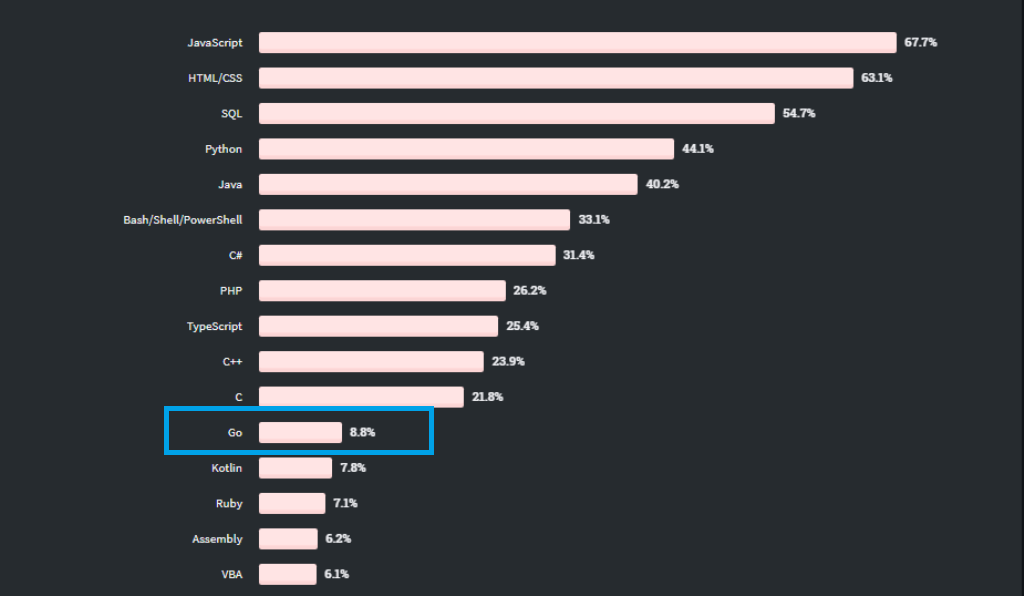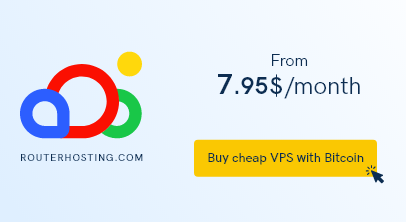Go is a compiled, multithreaded language created by Google for building web services and client/server applications that run on modern distributed systems and multi-core processors. In addition, it has low-level capabilities, does a great job with graphics, etc. By the way, one of the authors of Golang was Ken Thompson, he was also involved in the creation of the C language with a similar syntax.

Currently, the official compiler is supported for OS FreeBSD, OpenBSD, Linux, macOS, Windows, DragonFly BSD, Plan 9, Solaris, Android, AIX. Go is also supported by the gcc compiler suite.
Although the language is relatively young, about 1% of developers switch to it every year, which indicates an increase in its popularity. Stack Overflow polls showed that in 2020, 8.8% of developers used Go, and this year the number has grown to 9.55%. So let’s figure out why you should use Golang and what it is good for.

Golang Features
Go is developing as an open-source project, that is, all its codes and the compiler can be found and used for free (on the official site https://golang.org). Programs written for one OS can be easily ported to another with recompilation.
Main features of Golang:
- Compilability: the compiler translates the Go program into machine code that is understandable for the platform;
- Strong static typing;
- Using dynamic arrays, hash tables and slices;
- Automatic garbage collector;
- Support for network protocols and parallel programming;
- Concise syntax;
- Parallelism allows simultaneous execution of functions.
Go lacks inheritance, but that doesn’t mean there is no hierarchy in the code. It just works differently. The model does not have the usual objects and classes, but it has data structures with all the methods.
Go Language: Pros and Cons
Go shouldn’t be seen as a killer of other programming languages. Neither C ++ nor Java will disappear because Go has its own niche in the market.
This language was created thinking that the programs in it would be translated into object code and executed directly, without a virtual machine. Therefore, it enables fast compilation into efficient object code without excessive dynamic maintenance requirements. Thus, it is a great tool for large software projects, networking services, and server-side development.
Main advantages:
- Simplicity. Simplified syntax allows you to reduce the time of learning the language and increase the speed of development. This is what makes Go suitable for large corporations.
- Fast compilation.
- Versioning (each Go release is supported only until two new major releases are available) and free updates.
- A large number of native libraries, you can also work with libraries in C.
The disadvantages of the language are conditional, but there are some:
- Forced formatting: not always considered a disadvantage, as every next developer knows exactly what to expect from the predecessor code.
- Simplified syntax can create problems by preventing you from writing your own code and maintaining a unique programming style.
Nevertheless, Go is good at least by allowing you to create secure and scalable applications with minimal effort.
What makes Go special?
Until recently, languages that have existed for many years were sufficient for large-scale programming. However, the computing environment has changed over the past decade. A lot of networking, cluster or cloud computing has emerged, many properties of the modern computing environment that older languages do not directly address.
Go is well adapted to today’s computing environment. It is effective when to run on hundreds or even thousands of machines. Thanks to it, you will not have to waste resources due to an inefficient interpreter or some of the problems that usually arise when implementing virtual machines.
Who needs Go?
Go was created to design robust software. Google needed a simple tool to write robust code, so this looks promising for large development teams focused on the Google ecosystem.
You can invite a hundred mediocre programmers who will generate good and very maintainable code! This is a fantastic management tool. The team works within the go-fmt framework (no one can use their own formatting style), any interface abstractions are excluded and you get a real code pipeline!
If the company employs a lot of people, big projects and all that stuff, this is perfect! Currently, the language is widely used in various fields. It is used by such giants as IBM, Intel, Ozon, Google, Dropbox, Netflix, Kubernetes, Docker, Twitch, Uber, and CloudFlare. In addition, due to its simplicity and small manual, Go is ideal for beginners. It is often chosen as the first programming language.
What can you do with Go?
Go’s capabilities are best suited to the requirements of large enterprise systems. Basically, we are talking about back-end development. While you can create a user interface with Go, the corporate experience is about using the language where it can provide the most benefits.
A significant proportion of applications belong to various subcomponents of giant corporate platforms, real estate management systems, content management systems, and any other management systems, so the list of Go solutions is wide:
- applications for monitoring;
- notification services;
- reporting tools;
- command line utilities;
- storage systems;
- feedback applications;
- sandbox software (Docker, Kubernetes);
- collaboration planners;
- geofence services (Uber);
- chats (Twitch);
- API Automation (Dailymotion);
- client libraries (Dropbox).
In other words, highly scalable networking services, combinations of microservices, heavily loaded administration systems, and various background batch applications are areas where Golang is definitely worth using.
What do you need to work with Go?
First of all, you need a text editor to type the code and a compiler to convert the code into an executable file. You can also use special integrated development environments (IDEs), for example, GoLand from JetBrains. There are Go plugins for other IDEs, notably IntelliJ IDEA, and Netbeans.
Why do you need Go?
Go is a good choice if you have complex networks with many nodes that need to be orchestrated (judging by how CloudFlare works). If you want to make a console utility like docker, Go is fine for it, too.
Go is the choice if you want a fast and efficient backend. On the one hand, it is quite difficult to make CRUD in it, on the other hand, there are a lot of different frameworks that help make your work easier.
The language is used in console utilities, networks, and backends. That’s it. It was originally a language that was made for students to be able to write code for Google’s fancy network infrastructure. Conclusion: If you don’t write software for the network, a console utility, or a high load backend, then most likely you don’t need Go.
Is it worth learning Go?
Yes, Go is worth learning anyway, because:
- It’s easy – a simpler language that this one is hard to come up with. It has very few grammars and abstractions, and the holes and traps for beginners are fairly easy to get around.
- Go will sooner or later penetrate very deeply into our lives, as more and more new projects are being done on it. Having such a popular tool in stock is always a good thing.
Go is an ambitious attempt to take the best from languages like C ++, Java and Pascal, and make something simpler. The principles used in its creation will be relevant for all new languages. They are the future, and this is the most compelling reason to learn Go.

Conclusion
Go is simple, efficient, and very beginner-friendly, so it definitely won’t hurt you to learn it. But it is important to clearly understand who should use it and for what. If you work for a large corporation or own a startup that develops smart networked peta clusters and metaparadigms, Go would be absolutely essential for you.




